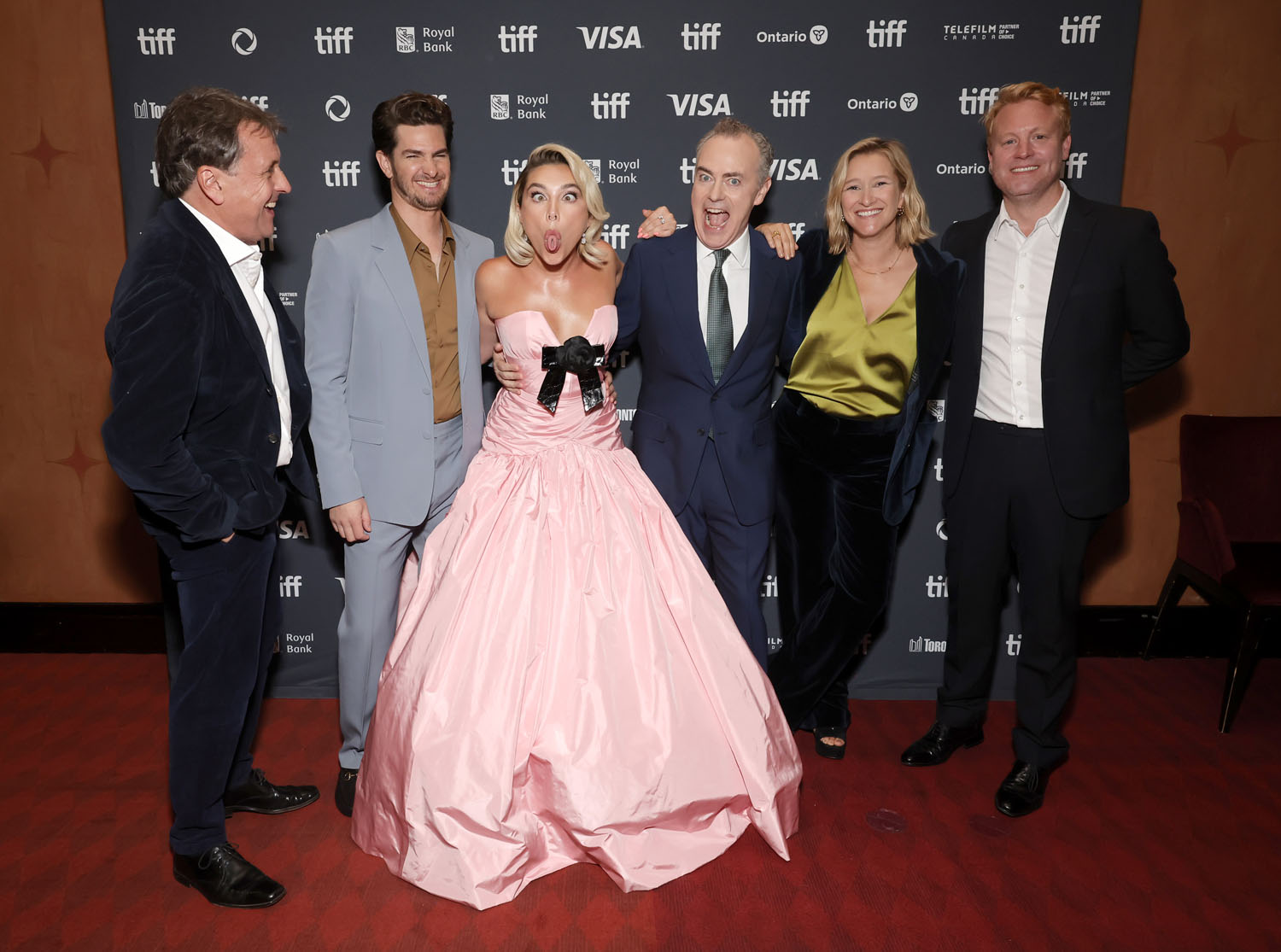TIFF Review: We Live In Time



It seems like every few years, we get a good old-fashioned weepy, usually about a romance doomed by disease, often cancer, that sunders a lovely couple, often when they are still young, and their fate feels all the more deeply unfair.
The most recent entry into this very specific yet frequently recurring dramatic sub-genre is John Crowley’s We Live in Time, which reunites Crowley with his Boy A star, Andrew Garfield, and also brings in Florence Pugh as a young woman stricken with cancer. The film, written by Nick Payne, hopscotches around the relationship of Tobias (Garfield), a nerd, and Almut (Pugh), a hot chef. They have an adorable young daughter, Ella (Grace Delaney); Almut’s restaurant is “Anglo-Bavarian”, and we’re told it’s very good, but I need to taste the “Douglas Fir parfait” for myself to believe that; and they are in all ways a beautiful, charismatic family living in an idyllic cottage: a perfect family unit.
Until cancer is invoked, a second occurrence for Almut, who has already lost one ovary to the disease. At age indeterminate—at one point she says she’s 34, but there is no clear sense how much time passes throughout their relationship—Almut isn’t sure she has it in her to fight cancer again. Maybe she just wants to spend what time she has with her family making good memories, and not “puking her guts out”. Quality over quantity, Tobias says, and Almut nods along. Also, Almut is put forward for the Bocuse d’Or, a kind of “cooking Olympics”, to represent the UK in the prestigious international cook-off. She mentions it to Tobias, but he wants her to slow down, focus on her health. We skip through time, and then Almut is both undergoing chemo and preparing for the Bocuse d’Or. The sense of conflict in this film is weird. Problems present themselves, but Tobias and Almut glide past like they are barely touched beyond the surface of their lives. The time-jumping structure of the film really doesn’t help with building or sustaining tension.
I feel like a terrible curmudgeon confessing none of this works for me. Garfield and Pugh are terrific together, their chemistry is the only thing that makes Time worthwhile. Without them, the film is nothing. But both their performances and the story itself are undercut by the hopscotching timeline, which seems done only to inject some life into what is otherwise a very tired premise. We’ve seen this story a thousand times before, and jumbling the timeline isn’t enough to make it feel fresh. The most interesting aspect of Tobias and Almut’s story is how strange things keep happening to them, like their, er, meet cute when Almut literally hits Tobias with her car, landing him in the hospital, or how she ends up delivering their baby in a petrol station bathroom. There is a way in which Almut’s cancer diagnosis could connect to their rather bad luck, but that connection is never made, instead they just have these quirky things happen and then, cancer.
The film looks lovely, though, only being shot in the prettiest parts of London and in Tobias and Almut’s cozy country cottage. Time isn’t badly made on any level, it’s just such a hackneyed story and the timey-wimey editing trick doesn’t make up for how basic it is. Worse, it’s hard to fully appreciate the character arcs of Tobias and Almut, and the work Garfield and Pugh are doing to make them believable, when we keep getting jerked in and out of major milestones in their relationship. There is no dramatic tension when scenes of Almut in labor are intercut with the moment their relationship almost breaks down because Almut isn’t sure she even wants kids. It’s hard to invest in anything when we know from the beginning that these two crazy kids are gonna make it, up until the cancer inevitably kills Almut at a tragically young age.
Nothing about Time feels organic—except for Almut’s cooking—simply because of the herky-jerky timeline. But again, that was probably done to spice up this extremely cliché premise. The actors and characters would have been served better by straightforward storytelling, but undoubtedly, that version of the story would feel even more rehashed than it already does. (It doesn’t help that there is another film that has a similar “carpe diem” message and features a parent dying young of cancer that actually DOES find a fresh way to approach the story, but more on The Life of Chuck later.) We Live in Time is so earnest and unabashed about being a tear-jerker, it feels mean to pick on it, but there’s no getting around that it doesn’t work. Mixing up the timeline isn’t enough to make this anything other than a reheated hash of other weepy romances, though Andrew Garfield and Florence Pugh do make it watchable. We Live in Time: it’s watchable.
We Live in Time will play exclusively in theaters from October 11, 2024.













